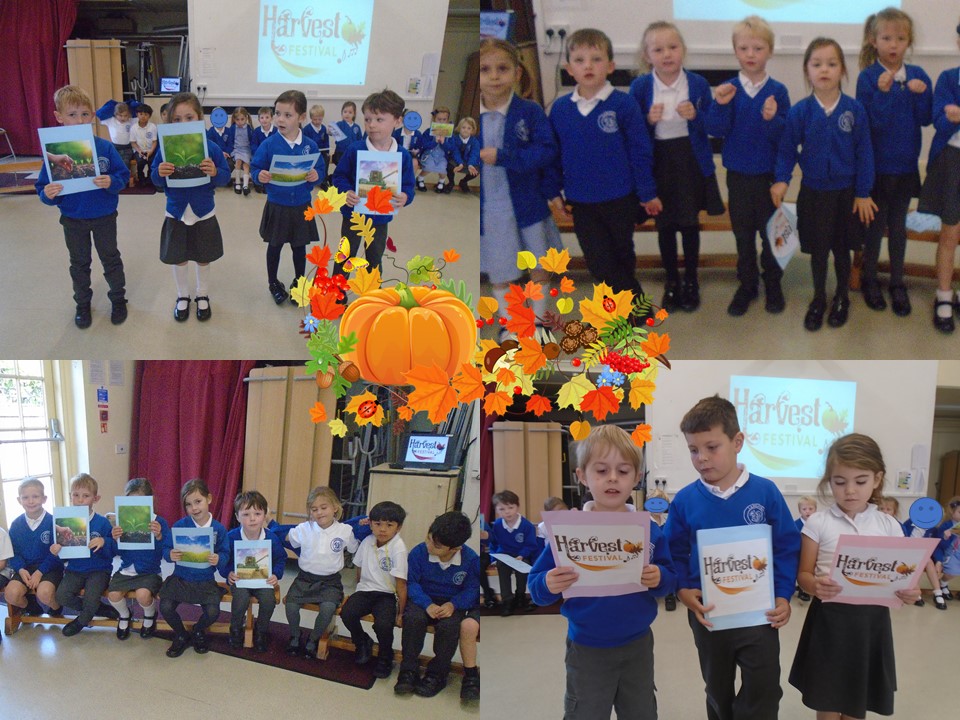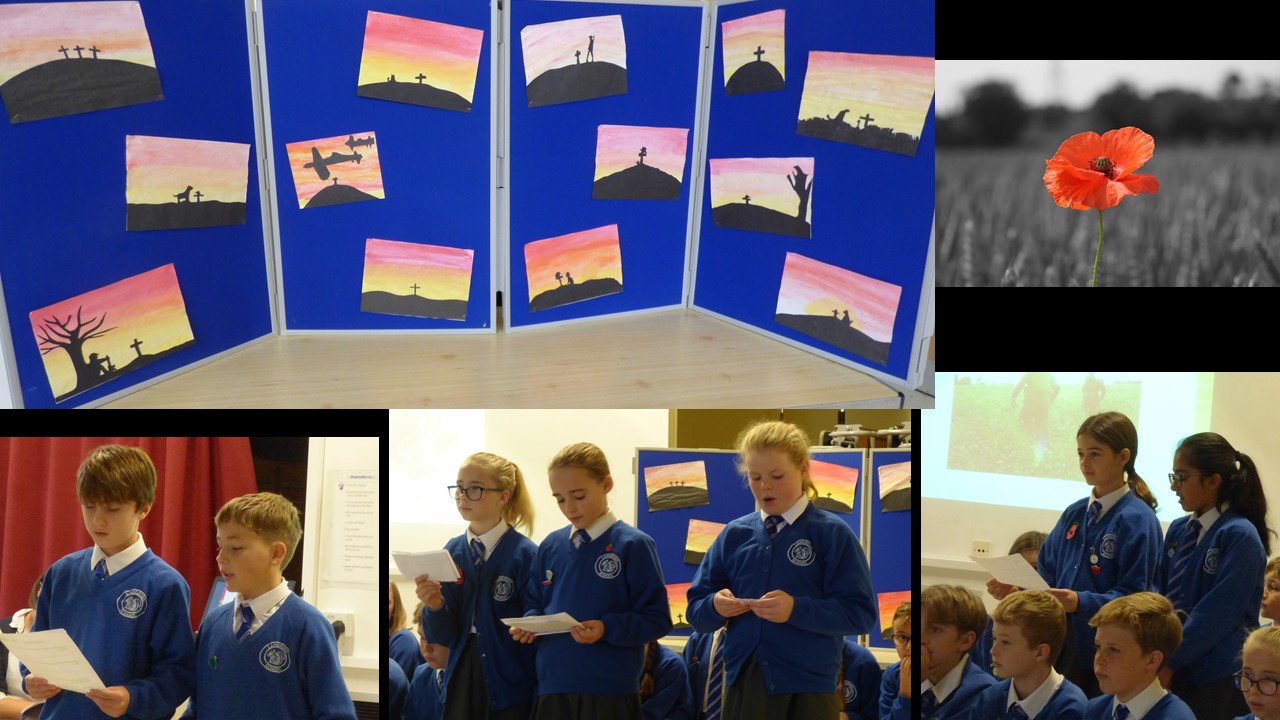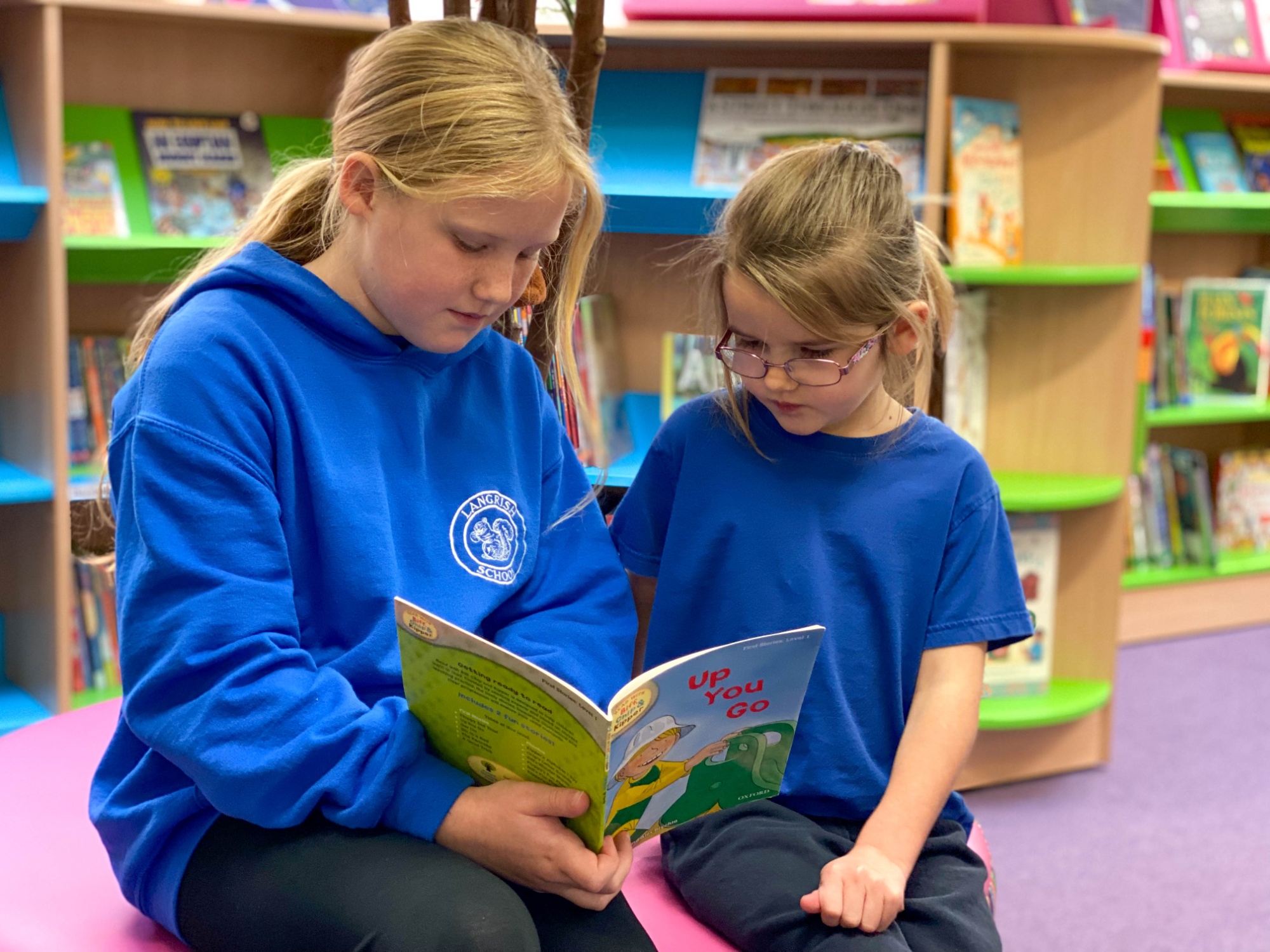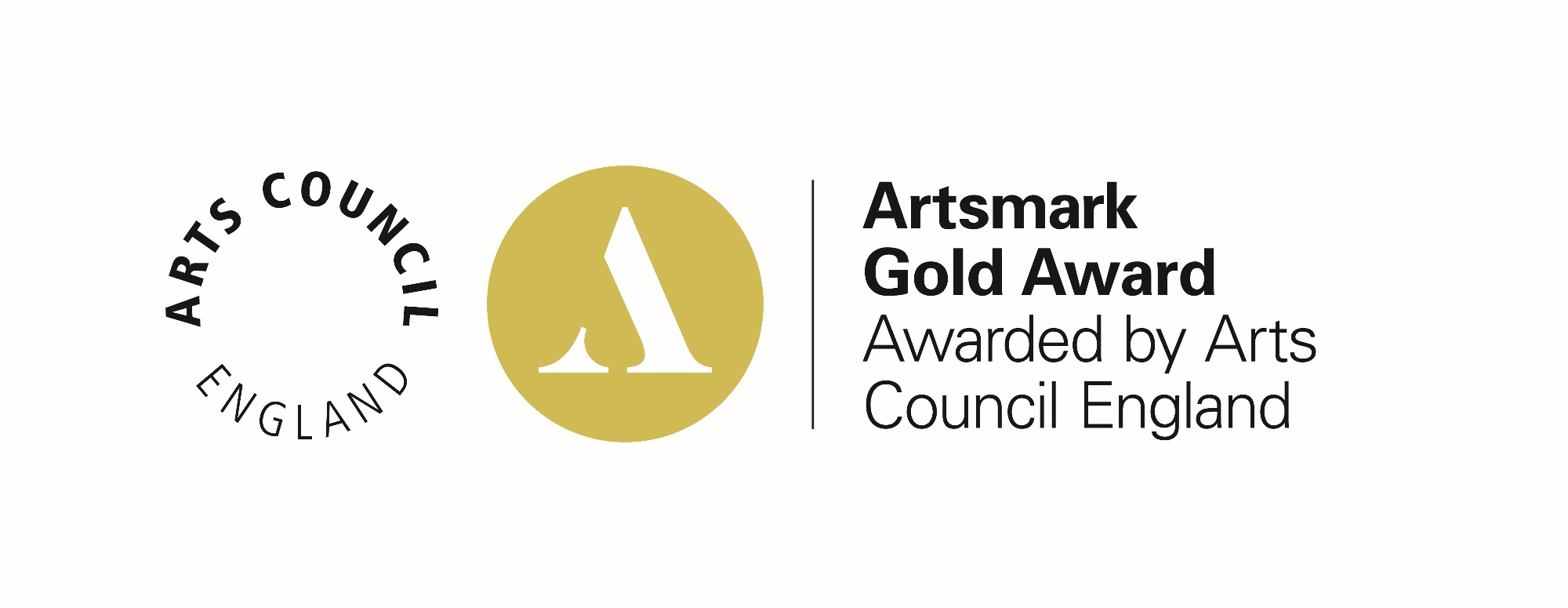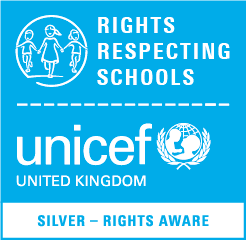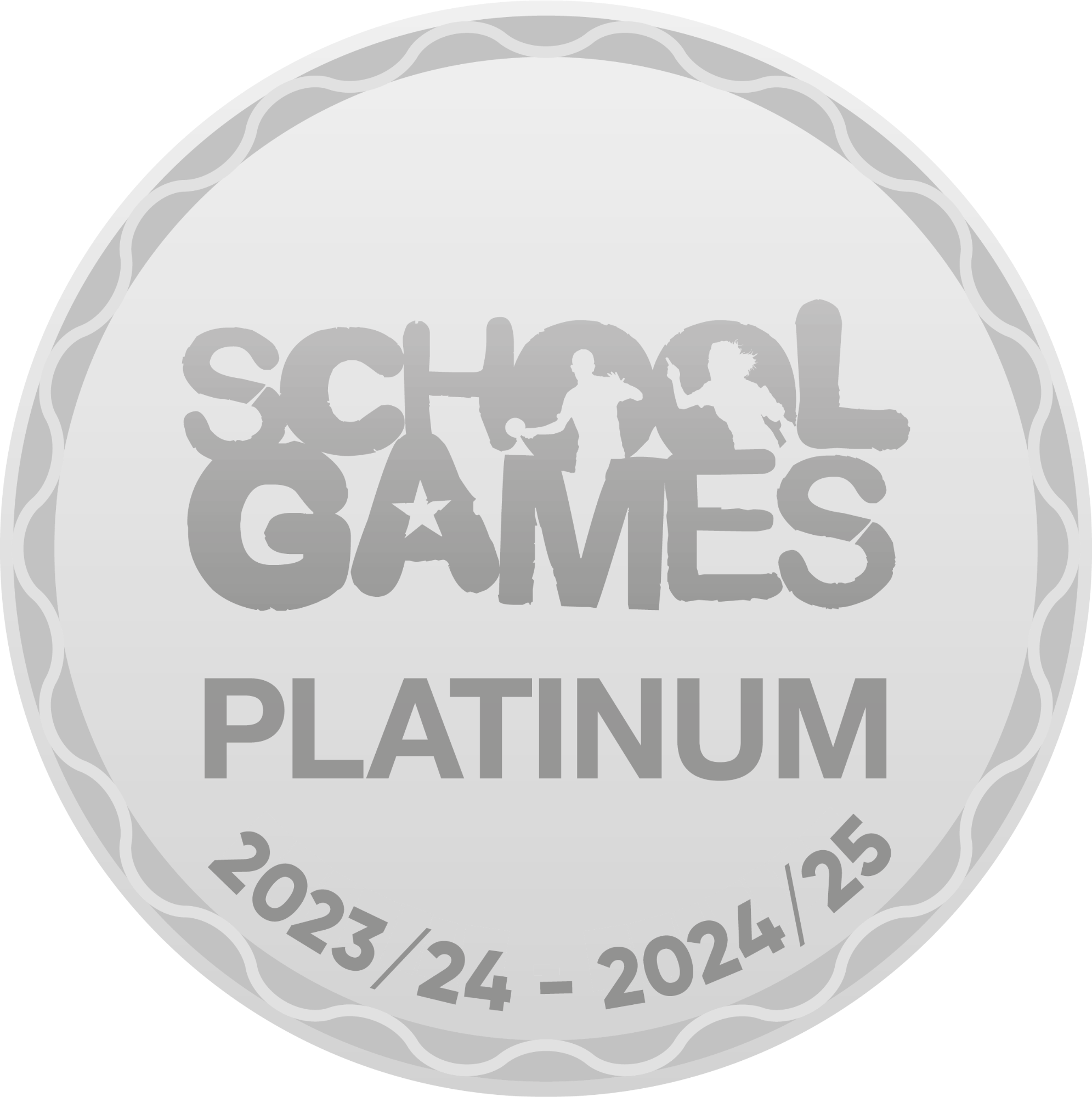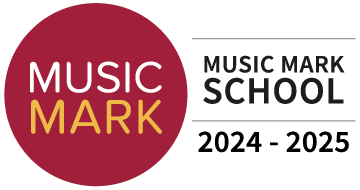English
Children should be taught to write and speak fluently so that they can communicate their ideas and emotions to others and, through their reading and listening, others can communicate with them. Through reading in particular, pupils have a chance to develop culturally, emotionally, intellectually, socially and spiritually.’
- (DfE Curriculum document 2013)
Intent
Langrish's intent for English is to ensure that all pupils leave us as enthusiastic readers, creative writers and confident speakers. Through a strong reading culture, the needs of the individual reader are nurtured, so all pupils become fluent and discover texts and authors which they are passionate about. English lessons expose pupils to a breadth of topics and stimuli, whilst teaching the technical skills to allow pupils to respond to these orally and through their writing, to create pieces that are both effective and satisfying. The skills developed through our English curriculum empower our children to express themselves in all areas: it is at the heart of everything we do.
Implementation: How is knowledge and understanding structured, organised and developed across the English curriculum?
The study and mastery of English is an essential means by which to empower pupils to interpret the world around them; appropriate skills and knowledge in English are key to thinking and learning. Through our curriculum at Langrish, children are enabled to express themselves creatively and imaginatively whether they are immersed in reading, composing written texts or engaging in oral debates and presentations.
English is taught through carefully selected units which lend themselves to the children's interests, styles of learning and next steps. Care is taken to ensure that the context for learning is both stimulating and challenging enough to broaden our pupil's experiences of language and text, while familiar enough to develop confidence. All elements of English, from early phonics to more complex grammar skills, are carefully planned for progression and interwoven through these units as our learners become ready for them.
Children are encouraged to take risks with their language - using new vocabulary, techniques and structures; this is facilitated by regularly playing with language, engaging in drama activities and responding to a range of stimuli including multi-media and a variety of written texts. Learning conferences support children in identifying their own successes and next steps and guide them to see how they can achieve these.
Children become readers through their exposure to rich and varied texts. Their passion is nurtured through opportunities to share books with their peers and with adults at school and at home.
Reading
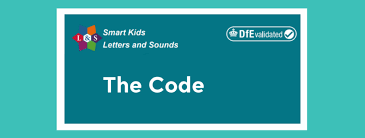 Early reading skills are developed at Langrish from day one, across the curriculum and in close partnership with parents. Ten-minute daily phonics sessions, based around a DFE-approved systematic synthetic phonics programme, runs across the Infant classes, with targeted focus groups or interventions for any child needing additional support. Learning is then reinforced and embedded through a text-rich environment, including books specifically linked to the current phonics phase, the sharing of class stories, and individual reading and library books which are taken home and shared. Learning key words is a crucial step in developing confidence and fluency in reading. These are introduced during the Autumn Term in Year R, shared with parents through class web pages and sent home to be practised alongside book-banded reading books. Key words, tricky words and high-frequency words also appear on each class’ Word Wall in an order consistent with that in which they will be encountered by the children as they progress through the book bands. The Word Wall’s colour-coded borders make clear the vocabulary expected at each reading level, helping the children to strive for their next target, as well as being able to see and celebrate the progress and achievements on their own reading journey.
Early reading skills are developed at Langrish from day one, across the curriculum and in close partnership with parents. Ten-minute daily phonics sessions, based around a DFE-approved systematic synthetic phonics programme, runs across the Infant classes, with targeted focus groups or interventions for any child needing additional support. Learning is then reinforced and embedded through a text-rich environment, including books specifically linked to the current phonics phase, the sharing of class stories, and individual reading and library books which are taken home and shared. Learning key words is a crucial step in developing confidence and fluency in reading. These are introduced during the Autumn Term in Year R, shared with parents through class web pages and sent home to be practised alongside book-banded reading books. Key words, tricky words and high-frequency words also appear on each class’ Word Wall in an order consistent with that in which they will be encountered by the children as they progress through the book bands. The Word Wall’s colour-coded borders make clear the vocabulary expected at each reading level, helping the children to strive for their next target, as well as being able to see and celebrate the progress and achievements on their own reading journey.
Here are the links to the YouTube videos of our phonics sounds and tricky words wall:
As the children's reading progresses, our focus is on developing higher-order reading skills such as inference and deduction, skimming and scanning and the ability to read texts critically. In addition to shared analysis of reading material in curriculum lessons, children continue to participate in daily, whole-class guided reading sessions where the development of vocabulary and inference skills are a priority; in these sessions, texts are selected at a higher level than might be read independently to provide appropriate challenge. Where necessary, specific phonic support is used to develop children’s reading skills through the use of interventions such as Sound Routes.
A wide range of rich, stimulating texts, both fiction and non-fiction, are available for pupils in the classrooms and library. Children choose library books to promote a love of reading; for each text read, they are encouraged to respond to a Bloom's reading question (see attachment) in their Reading Record.
The school also runs annual book days, online book fairs and an Autumn Term reading challenge to promote reading.
Writing
Attention is paid throughout the school to the formal structures of English, grammatical detail, punctuation and spelling. The word walls used in the younger years evolve into Spelling displays for the current learning and Word Power walls to capture new vocabulary, which the children then strive to use appropriately in their own compositions. Teachers model writing strategies and the use of phonics and spelling strategies in shared writing sessions. Guided writing, used particularly in pupil conferencing sessions, targets specific needs of both groups and individuals, whilst children have regular opportunities to write at length in extended, independent writing sessions.
The children are given frequent opportunities in school to write in different styles and for a variety of audiences, using quality texts as a model. Opportunities to use a range of engaging stimuli for writing are regularly provided, including Talk4Writing, music, drama and film; more confident writers are also given regular opportunities to write more freely about a topic or in a style of their choice through our 'Freedom Friday' challenges.
Wherever possible, feedback is given to the children as they write to support them in editing and reviewing their work. Each class uses English working walls and Learning Journeys to support the children in self-assessing their writing against agreed criteria. The acronyms of CUPS (capitals, usage, punctuation, spelling) and ARMS (add, remove, muddle, substitute) are used across the school to further support the children's independence with editing. Non-negotiables for each year group are displayed and referred to when writing in any subject to maintain high, consistent expectations for all.
Pupils at Langrish are exposed to a variety of different teaching techniques to learn how to read and write. One of these techniques is Talk4Writing, which in EYFS and KS1 is completed every half-term. Our pupils learn to retell stories and follow the imitation, innovation and invention process of Talk4Writing. In LKS2, pupils are exposed to this once a term. In UKS2, pupils try this process once a year.
Spelling
Once the children have completed phase 5 in phonics (following The Code's scheme of work), we then use No Nonsense Spelling to map the progression of skills taught (see attachment below). This resource is aligned to the National Curriculum expectations and supplemented by the resources produced by Spelling Shed. This is also part of our Home Learning provision, allowing the children to continue practising the spelling rules and patterns at home.
Spoken Language
Pupils are taught the conventions for discussion and debate within English lessons are and given opportunities to employ and develop these across the curriculum. Through workshops, the English lesson and class performances, all pupils are enabled to participate in and gain knowledge, skills and understanding associated with the artistic process of drama. They may be involved in scripted plays, read their own or others' work aloud, work collaboratively to create their own role plays or take part in drama activities, such as hot-seating, to better understand a character or text studied. Trips to local theatres, watching performances by others in school and enjoying the annual visiting pantomime all provide opportunities for the children to experience performances and respond to these reflectively.
Impact
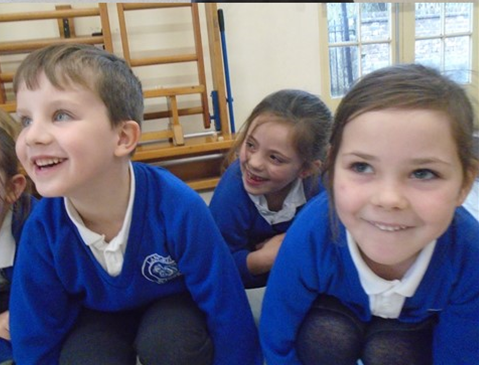
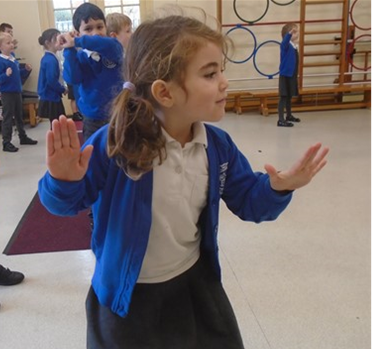
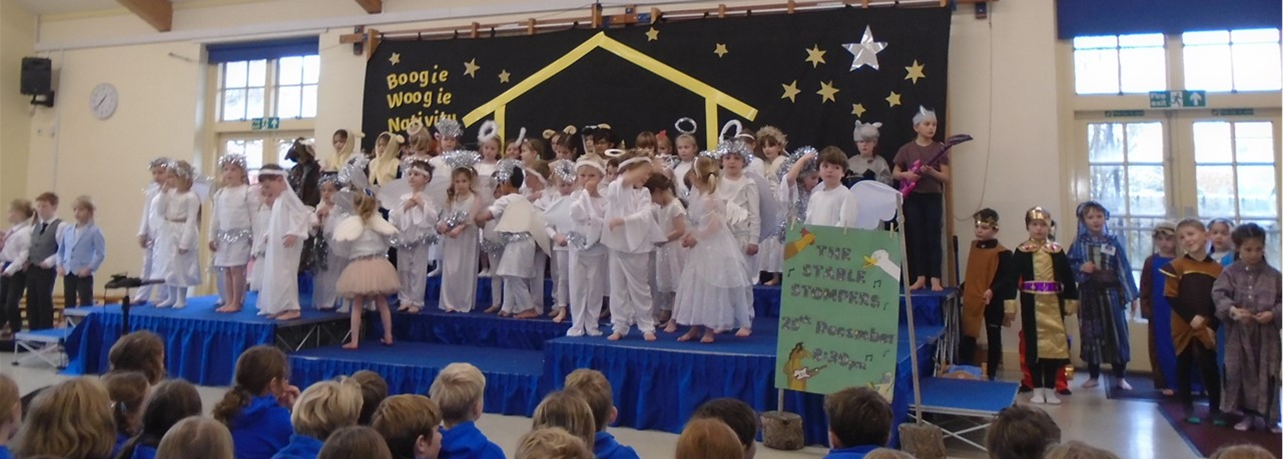
Performance poetry spirals throughout our curriculum from Year 1, who create and perform acrostic poems for part of their assembly in Harvest, to Year 6, who lead our Remembrance Service, sharing some history of the event before reading out a selection of their own poetry.
